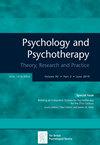A pre and post evaluation of the communication and interaction training programme for professionals in dementia care
Abstract
Background
NICE guidelines advocate that healthcare professionals should aim to use non-pharmacological and person-centred approaches as primary strategies to reduce or prevent distress in people living with dementia who reside within care settings. However, despite these recommendations, recent studies have illustrated that there is still a requirement for healthcare professionals to have adequate opportunities to access training programmes and guidance on how to effectively use non-pharmacological approaches in dementia care settings. Communication and Interaction Training (CAIT) was developed to train healthcare professionals in dementia care on how to apply person-centred principles to effectively reduce or negate distress in people living with dementia in a non-invasive manner.
Aims
This paper provides an overview of current debates regarding the use of non-pharmacological approaches in dementia care, as initial care strategies, to reduce the primary use of pharmacological interventions that may have deleterious side effects for people living with dementia. Furthermore, this paper provides a summary of an evaluation that assessed the extent to which a 2-day CAIT programme could enhance healthcare professionals in their perceived ability to communicate therapeutically with and provide care for people living with dementia.
Materials & Methods
In this evaluation, 35 healthcare professionals in dementia care engaged with the 2-day CAIT programme. The Confidence in Dementia Scale, Knowledge in Dementia Scale and Compassionate Competence Scale were administered for participants to complete pre and post training.
Results
A series of parametric paired samples t-tests were completed, and the results indicated that the 2-day CAIT course was effective in enhancing healthcare professionals' perceived confidence, communication skills, sensitivity, and ability to meet the care needs of people living with dementia. However, staff’ knowledge of dementia did not significantly increase following the CAIT course, which could be due to participants already having high levels of knowledge on dementia prior to training.
Discussion & Conclusion
These results indicated that engaging in CAIT could be beneficial in enhancing healthcare professionals' perceived ability to use therapeutic communication strategies in their interactions with people living with dementia. Discussion is provided on how the delivery of training programmes, such as CAIT, may assist in re-enforcing guidelines that advocate for the use of non-pharmacological and non-invasive approaches in dementia care.



 求助内容:
求助内容: 应助结果提醒方式:
应助结果提醒方式:


